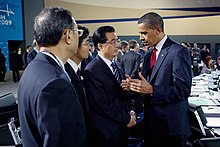Foreign policy
Main article: Foreign policy of the Barack Obama administration
In February and March, Vice President Joe Biden and Secretary of State Hillary Rodham Clinton made separate overseas trips to announce a "new era" in U.S. foreign relations with Russia and Europe, using the terms "break" and "reset" to signal major changes from the policies of the preceding administration.[178] Obama's granting of his first television interview as president to an Arabic cable network, Al Arabiya, was seen as an attempt to reach out to Arab leaders.[179]
On March 19, Obama continued his outreach to the Muslim world, releasing a New Year's video message to the people and government of Iran.[180] This attempt at outreach was rebuffed by the Iranian leadership.[181] In April, Obama gave a speech in Ankara, Turkey, which was well received by many Arab governments.[182] On June 4, 2009, Obama delivered a speech at Cairo University in Egypt calling for "a new beginning" in relations between the Islamic world and the United States and promoting Middle East peace.[183]

The Prime Minister of the United Kingdom, David Cameron, and the President of the United States, Barack Obama, during the 2010 G-20 Toronto summit.
On June 26, 2009, in response to the Iranian government's actions towards protesters following Iran's 2009 presidential election, Obama said: "The violence perpetrated against them is outrageous. We see it and we condemn it."[184] On July 7, while in Moscow, he responded to a Vice President Biden comment on a possible Israeli military strike on Iran by saying: "We have said directly to the Israelis that it is important to try and resolve this in an international setting in a way that does not create major conflict in the Middle East."[185]
On September 24, 2009, Obama became the first sitting U.S. president to preside over a meeting of the United Nations Security Council.[186]
In March 2010, Obama took a public stance against plans by the government of Israeli Prime Minister Benjamin Netanyahu to continue building Jewish housing projects in predominantly Arab neighborhoods of East Jerusalem.[187][188] During the same month, an agreement was reached with the administration of Russian President Dmitri Medvedev to replace the 1991 Strategic Arms Reduction Treaty with a new pact reducing the number of long-range nuclear weapons in the arsenals of both countries by about one-third.[189]
Iraq war
Main article: Iraq War
During his presidential transition, President-elect Obama announced that he would retain the incumbent Defense Secretary, Robert Gates, in his Cabinet.[190]
On February 27, 2009, Obama declared that combat operations would end in Iraq within 18 months. His remarks were made to a group of Marines preparing for deployment to Afghanistan. Obama said, "Let me say this as plainly as I can: By August 31, 2010, our combat mission in Iraq will end."[191] The Obama administration scheduled the withdrawal of combat troops to be completed by August 2010, decreasing troops levels from 142,000 while leaving a transitional force of 35,000 to 50,000 in Iraq until the end of 2011. On August 19, 2010 the last US combat brigade exited Iraq. The plan is to transition the mission of the remaining troops from combat operations to counter-terrorism and the training, equipping, and advising of Iraqi security forces.[192][193] On August 31, 2010, Obama announced that the U.S. combat mission in Iraq was over.[194]
War in Afghanistan
Main article: War in Afghanistan (2001–present)
Early in his presidency, Obama moved to bolster U.S. troop strength in Afghanistan.[195] He announced an increase to U.S. troop levels of 17,000 in February 2009 to "stabilize a deteriorating situation in Afghanistan", an area he said had not received the "strategic attention, direction and resources it urgently requires".[196] He replaced the military commander in Afghanistan, General David D. McKiernan, with former Special Forces commander Lt. Gen. Stanley A. McChrystal in May 2009, indicating that McChrystal's Special Forces experience would facilitate the use of counterinsurgency tactics in the war.[197] On December 1, 2009, Obama announced the deployment of an additional 30,000 military personnel to Afghanistan.[198] He also proposed to begin troop withdrawals 18 months from that date.[199][200] McChrystal was replaced by David Petraeus in June 2010 after McChrystal's staff criticized White House personnel in a magazine article.[201]






0 comentarios:
Post a Comment